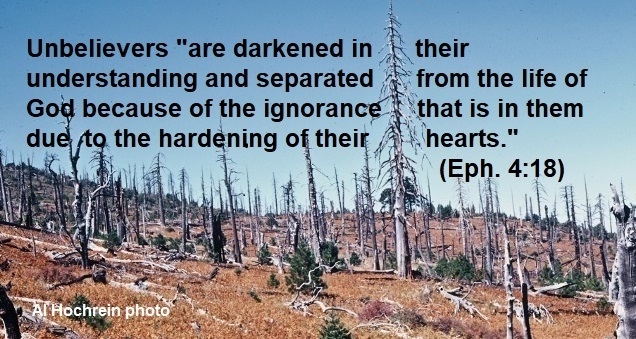
Part Four: The Real Reason Atheists, Agnostics, and Skeptics Reject God
The relationship between God and the human race is one of dependence. God is the creator, and we are created. This means we depend on God for our very existence as well as our physical, emotional, spiritual well-being—and ultimately, our peace and joy. Furthermore, God had a purpose for creating us: to love us and to have a personal relationship with us. In turn, God desires for us to love Him, obey Him, and enjoy the eternal blessings of this relationship. Our natural response to this is to praise and worship God.
Sadly, many people choose to reject God and seek fulfillment in counterfeit ways (what I refer to as “crutches”). But this is doomed to fail—even if such failure is denied or repressed. Why? Because when God created the human race, He placed an intuitive awareness of His existence in our hearts. So compelling is this inner testimony that the Bible says people who “suppress” this revelation are “without excuse”—that is, held accountable (Rom. 1:18-20; cf. Eccl. 3:11,14). No one can achieve true inner fulfillment and meaning in life apart from God. In his typical lucid style, C. S. Lewis said it this way:
God made us: invented us as a man invents an engine. A car is made to run on petrol, and it won’t run properly on anything else. Now God designed the human machine to run on Himself. He Himself is the fuel our spirits were designed to burn, or the food our spirits were designed to feed on. There isn’t any other. . . . God can’t give us happiness and peace apart from Himself because it isn’t there. There’s no such thing. (The Case for Christianity)
I believe the real reason atheists, agnostics, and skeptics reject God is that (1) they refuse to acknowledge their innate awareness of His existence and (2) they do not want to be held accountable to God who created and loves them. Tragically, this willful rejection of God can reach a point where unbelievers so harden their hearts they are alive physically but dead spiritually (e.g., Eph. 4:17-19 2; Thess. 2:10).
Finally, to help justify their false sense of autonomy, some unbelievers perceive those who open their hearts and minds to God as weak, insecure, and need a religious crutch to cope with life. The tragic paradox is that the very things unbelievers strive so hard to achieve in their autonomy—inner fulfillment, the ultimate meaning of life, and genuine peace of mind—are there for the asking through the “crutch” of Jesus Christ. Apart from that crutch, the unbeliever will never obtain his or her deepest desires. Their ultimate destiny is not nonexistence—but an eternity in the worst of all possible worlds (see my six-part blog series beginning May 17, 2020). ©
NOTE: To receive personal notification for new blog posts, please join my blog email list. Click on “contact” above and send me a request. I do not share email addresses.
Next week’s blog post will explore what “crutch” and “weak” mean to a Christian.